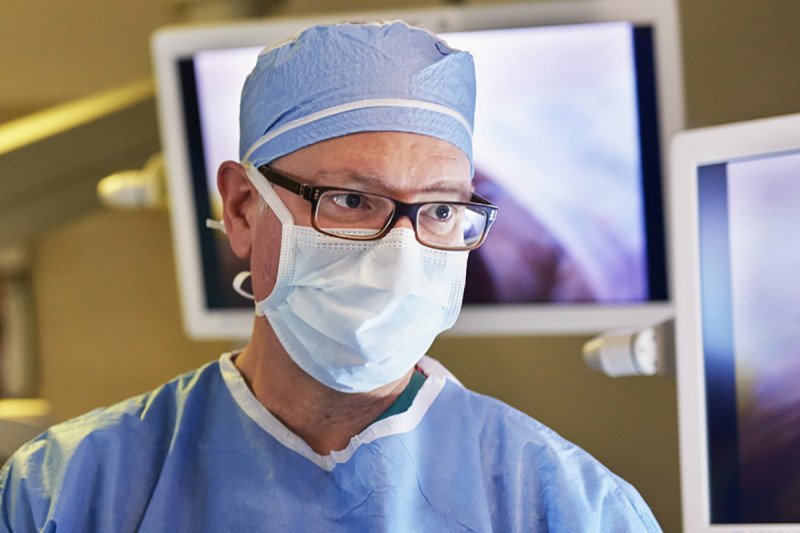
Lung cancer causes more deaths in the United States than colon, breast, and prostate cancers combined. Memorial Sloan Kettering launched the Fiona and Stanley Druckenmiller Center for Lung Cancer Research (DCLCR) in 2015 with three primary goals: to reveal more about the biology of lung cancer, to examine novel treatment approaches, and to bring promising new therapies to our patients.
Lung cancer is a tough disease to diagnose. People with lung cancer are largely asymptomatic in the early stages, which presents obstacles to early detection and subsequent treatment.
Led by Sylvia Hassenfeld Chair in Lung Cancer Research Charles Rudin, MD, PhD, Chief of the Thoracic Oncology Service, and Fiona and Stanley Druckenmiller Chair in Lung Cancer David Jones, MD, Chief of the Thoracic Service in the Department of Surgery at MSK, the DCLCR is a multidisciplinary group of more than 190 members from across MSK and the Sloan Kettering Institute, working in research and clinical labs for pathology, thoracic surgery, thoracic oncology, and other disciplines. This innovative model brings together researchers across specialties to pioneer techniques that advance cancer research and care.
Dr. Rudin is a translational researcher and leader in the study of lung cancer and other thoracic diseases as well as developmental therapy for advanced solid tumors. He has a particular interest in small cell lung cancer, an aggressive and fast-growing cancer that often metastasizes, or spreads, to other parts of the body.
Dr. Jones is a surgeon who specializes in the treatment of lung and esophageal cancer. A pioneer in lung cancer metastasis, he was the first to identify a suppressor gene called the BRMS-1, which was shown to inhibit metastasis in lung cancer. Dr. Jones is also Chair of the Thoracic Surgery Oncology Group (TSOG), a network of physicians from 25 hospitals throughout the United States whose mission is to advance patient care through multisite clinical trials.
Making It Possible
The DCLCR was made possible by a founding gift from Fiona and Stanley Druckenmiller. They are long-time supporters of MSK, and Mr. Druckenmiller has served on the MSK Board for many years. Philanthropy is one of the most critical drivers of research into novel therapies. It provides the necessary support for researchers to study cancer in innovative ways and invest in infrastructure to move research forward. The formation of the DCLCR has allowed Dr. Jones and Dr. Rudin to internally select and fund high-impact projects.
The Druckenmillers’ transformational gift was part of their vision to give back: “We recognized that there was an unmet need to fund basic research in lung cancer,” explains Mrs. Druckenmiller.
“We wanted to create more opportunities to support research endeavors that could lead to lifesaving treatments for many people with lung cancer,” adds Mr. Druckenmiller. “The researchers and physicians at the DCLCR have made tremendous strides in the past few years.”
The web of physicians and researchers collaborating across labs and departments at MSK is what gives the DCLCR its fighting power. Both Dr. Rudin and Dr. Jones believe that the key to future success lies in investing in new faculty members and providing support for their research projects — something they have been able to accomplish since the DCLCR’s inception.
“The clinical program is tremendously strong,” says Dr. Rudin. “We felt that the recruitment of laboratory-based investigators would really be the drivers of a new frontier of lung cancer therapies. The Druckenmillers have been amazing partners and supporters of the program.”
Applying Innovation to Personalized Care
Every cancer is unique. Physicians act as diagnostic matchmakers, pairing a specific tumor cell type to an effective treatment. In recent years, researchers have discovered a critical obstacle to this process: Tumors are often made up of many cell types. This phenomenon, called tumor heterogeneity, affects how a tumor may respond to a particular treatment. Combination therapies can go a long way to bridge this gap and target multiple cell types. MSK has pioneered leading-edge diagnostic techniques to close this gap even further.
MSK-IMPACT™ is a genetic test for solid tumors that analyzes 468 known cancer genes. It can detect mutations and other critical changes in the genes that make cancer vulnerable to particular drugs. DCLCR research member Michael Berger, PhD, Associate Director of the Marie-Josée and Henry R. Kravis Center for Molecular Oncology, was part of the team that developed MSK-IMPACT. As the first tumor-profiling test authorized by the US Food and Drug Administration, it can help physicians decide on the best course of treatment for their patients. Researchers have run over 57,000 tests to date, providing data that will inform the creation of new clinical trials across MSK.
Another new frontier is liquid biopsy: a blood test that analyzes small quantities of tumor DNA floating in the bloodstream. This diagnostic tool can be used to detect cancer at an early stage, opening up new avenues for effective treatment plans. In collaboration with Dr. Rudin and Dr. Jones at the DCLCR, the Thoracic Liquid Biopsy Program is directed by thoracic surgical oncologist James Isbell, MD, MSCI, Director of Quality and Outcomes in the Thoracic Surgery Service, and medical oncologist Bob Li, MD, MPH, Physician Ambassador to China and Asia-Pacific for the Bobst International Center. Investigators believe that liquid biopsy could be used to tailor treatments to patients without the use of invasive procedures. Clinical trials are already underway, including a large international study with the Chinese Thoracic Oncology Group and the TSOG.
Dr. Rudin and Dr. Jones also head the patient-derived lung cancer xenograft and organoid programs, respectively. Xenografts are created by implanting lung cancer tissue from human donors into mice. An organoid is a miniaturized version of a tumor grown in a lab. “The organoids and xenografts are really at the next level for how we’re going to address some of these problems of care for people with lung cancer,” says Dr. Jones. Both of these approaches allow researchers to test the effectiveness of drugs and other treatments prior to clinical trials. MSK’s collection of lung models is one of the largest and most studied in the world, providing new insights for cancer research everywhere.
“The Druckenmillers gave us a lot of freedom to pursue our vision,” says Dr. Rudin. “We’ve been able to invest in the creation of preclinical lung cancer models. And there was a big deficiency in the field. Before the DCLCR was created, there really weren’t good representative models of a lot of these cancers. We were able to build up a library that now contains several hundred models from patients.”
Understanding COVID-19 and Lung Cancer
For people with lung cancer, the infectious disease COVID-19, caused by the severe acute respiratory syndrome coronavirus 2 (SARS-CoV-2), has added an additional stressor. People with lung cancer are among those at the highest risk for complications from COVID-19. MSK is at the forefront of scientific efforts to combat this new disease and has treated over 1,000 patients with COVID-19. Despite the obstacles the pandemic has presented, progress hasn’t slowed down.
“It’s an exciting time for lung cancer treatment in this era in spite of the pandemic. There are many new developing diagnostic and therapeutic opportunities for patients that are really improving our ability to diagnose and treat this very difficult cancer,” says Bernard Park, MD, Deputy Chief of Clinical Affairs in the Thoracic Service.
Looking Forward
Surgery has always been the first line of defense in treating lung cancer. Recent advances have provided more personalized treatment options for people with lung cancer, including less invasive testing and surgeries that minimize complications.
Another area of emerging research is single-cell analysis, a field that has significantly expanded in recent years due to both technological and computational advances. The development of this technology will enable researchers to better understand tumor heterogeneity — specifically a phenomenon called lineage plasticity, which describes the ability of cells to evolve from one developmental pathway to another — in greater detail than ever before. According to Dr. Rudin, research into single-cell analysis could fundamentally change the way scientists look at drug resistance.
In the past five years, physicians have seen an increase in the long-term survival rates of people with metastatic lung cancer — a statistic that they hope to see continually rise. For people with resistant or metastatic lung cancer, novel treatment methods mean access to new clinical trials and a chance at remission.
“The gift of philanthropy allows us to explore new paths in cancer research and treatment,” says Dr. Jones. “It’s crucial to improve survival for people with lung cancer. We are enormously grateful to the Druckenmillers for providing the resources that make this research possible.”
To learn more about the Fiona and Stanley Druckenmiller Center for Lung Cancer Research or to find ways to support their research, visit MSK Giving (giving.mskcc.org/lung-cancer).


